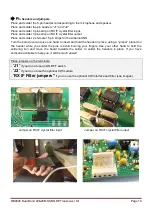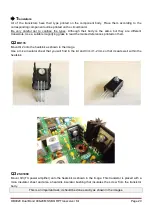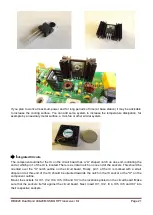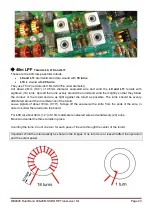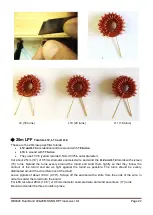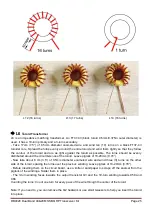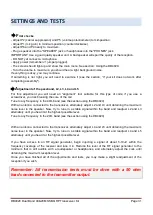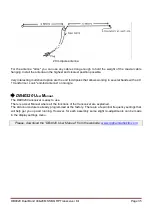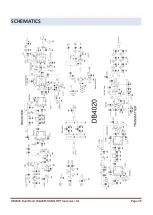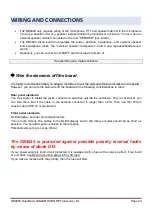
DB4020 Dual Band 40&20M SSB QRP Transceiver Kit
Page 32
T
ransmitter
Connect a power meter with a 50 ohm load to the antenna jack.
Adjust P1 (mic gain) to mid-position. Connect an electret condenser microphone to the microphone
input, put the transceiver in TX (PTT terminal to
“GND”) and speak or whistle loudly into the microphone.
The power meter will display the power output level. You can expect 6-8W on 40m and about 3.5W on
20m
You can now increase the P1 setting for the power of your choice. Depending on the sensitivity of the
microphone, you can adjust the P1 to the maximum.
For microphone wiring see “DB4020 Microphone” on “ANNEXES” section.
Normally P1 will be adjusted to mid-position.
Note: The passaband coils L2, L3, L4 and L5 work for both receive and transmit. You can make a slight
re-adjustment in transmission.
A
djustment of Balanced modulator (carrier suppression)
Adjust P1 (mic gain) to minimum (counterclockwise). Adjust P2 to mid-position.
Apply power. Now, activate the PTT pin of the mic and monitor the transmitter output with an
oscilloscope (with a 50 ohm load connected). Adjust P2 to obtain the minimum level possible of residual
carrier signal
If you don't have access to an oscilloscope, you may listen to the transmitted signal on a SSB/CW
receiver; adjust P2 until you hear the least possible amount of carrier signal. Keep in mind that with a
receiver so close, you will ALWAYS hear a weak residual signal.
When you finish adjusting, remember to raise P1 (mic gain) again.
The ideal position will always be very close to mid-position.
A
djustment of P6 S-Meter level
You can use another receiver to compare.
Tune in a stable signal and adjust P6 until the display shows the proper signal level.
Normally P6 will be adjusted to mid-position.
Note: The displayed signal level is for guidance only. They are not precise levels. It is not a calibrated
circuit.
A
djustment of P4 AGC
We recommend that you set P4 to maximum.
However, you can decrease and eliminate the action of the AGC by lowering the level of P4.
This AGC circuit will help you receive more comfortably, but if you receive very strong signals (local or
high power stations) you should attenuate the signals with the "RX ATTENUATOR" P3 potentiometer.


